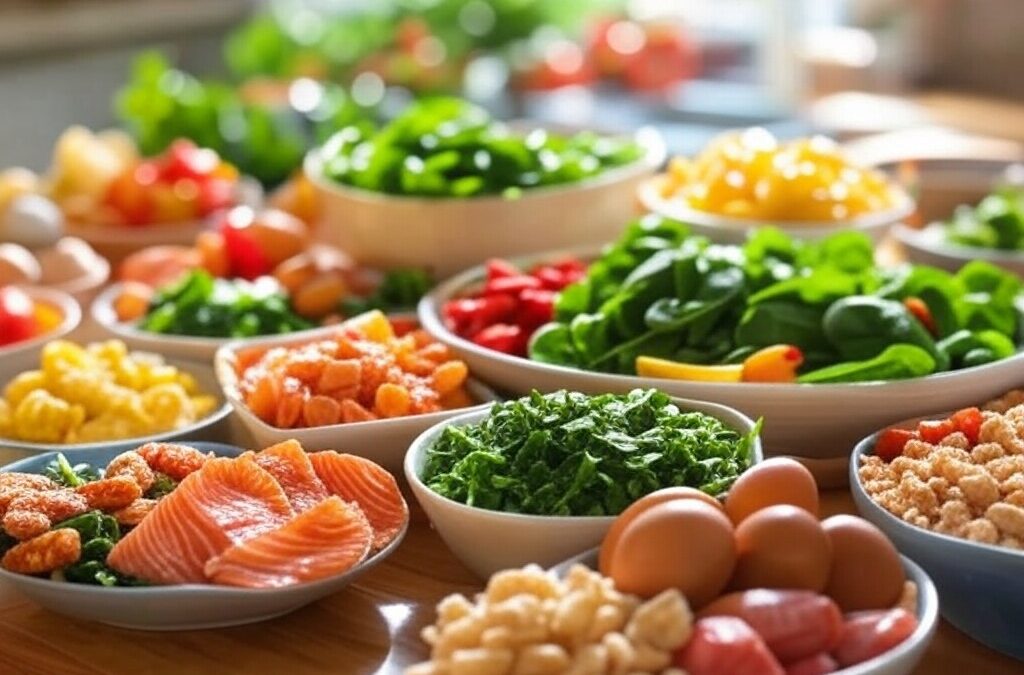Vitamin B12 is an essential nutrient that plays a critical role in energy production, red blood cell formation, brain health, and DNA synthesis.
Since the body cannot produce B12 on its own, it must be obtained through diet or supplementation.
In this guide, we’ll explore the best B12 food sources, supplement options, key factors for maximizing absorption, and how much B12 you need daily.
Best Food Sources of B12
B12 is naturally found in animal-based products and fortified foods. Below are some of the top sources categorized by food groups.
Protein Sources High in B12
Beef liver – 70.7 mcg per 3 oz (over 2900% of the RDA!)
Clams – 84 mcg per 3 oz (over 3500% of the RDA!)
Salmon – 4.8 mcg per 3 oz (200% of the RDA)
Tuna – 2.5 mcg per 3 oz (100% of the RDA)
Eggs – 0.6 mcg per large egg (25% of the RDA)
Chicken – 0.3 mcg per 3 oz (12% of the RDA)
Turkey – 0.8 mcg per 3 oz (33% of the RDA)
Vegetables Containing B12
B12 is generally absent in plant-based foods unless fortified. Some options include:
Nori (seaweed) – Contains small amounts (not reliable for meeting daily needs)
Mushrooms (Shiitake) – May have trace amounts (~1.3 mcg per 50g dried, ~54% of the RDA per 100g dried)
Fortified plant-based meat alternatives – Varies by brand (~2-6 mcg per serving,80-250% of the RDA per serving)
Fruits with B12
Fruits do not naturally contain B12, but some fortified options include:
Fortified plant-based fruit juices – Typically 1-3 mcg per cup (40-125% of the RDA per cup)
Fortified smoothie blends – Varies by brand (~1-5 mcg per serving, 40-200% of the RDA per serving)
Grains & Cereals with B12
Many grain products are fortified with B12 to help meet dietary needs:
Fortified breakfast cereals – 1-6 mcg per serving (40-250% of the RDA per serving)
Fortified whole-grain bread – 0.5-1 mcg per slice (20-42% of the RDA per slice)
Fortified oatmeal – 1-3 mcg per serving (40-125% of the RDA per serving)
Dairy Products with B12
Dairy is a great source of B12 and other vital nutrients:
Milk – 1.2 mcg per cup (50% of the RDA)
Yogurt – 1.4 mcg per cup (58% of the RDA)
Cheese (Swiss, Mozzarella, Cottage Cheese) – 0.9-1.5 mcg per serving (38-63% of the RDA per serving)
Oils and Fats with B12
Oils and fats do not naturally contain B12, but they can be used to cook B12-rich foods for better absorption. Consider using:
- Ghee or butter (if consuming animal products)
- Olive oil or avocado oil when preparing fortified foods
Best B12 Supplements & How to Choose
If dietary intake is insufficient, B12 supplements can help meet daily requirements. When choosing a supplement, consider:
- Forms of B12: Methylcobalamin (highly bioavailable), Cyanocobalamin (synthetic but effective), Hydroxocobalamin (longer-lasting), Adenosylcobalamin (supports mitochondria)
- Additional Ingredients: Look for clean, additive-free options, and avoid unnecessary fillers.
- Absorption Methods: Sublingual tablets, sprays, liquid b12, and injections tend to be better absorbed than standard pills.
Foods That Enhance B12 Absorption
Certain foods help optimize B12 absorption:
Protein-Rich Foods:
Aid stomach acid production, which is needed for B12 release.
Folate-Rich Vegetables:
Leafy greens like spinach and kale work synergistically with B12.
Probiotic Foods:
Yogurt, kimchi, and sauerkraut support gut health, improving nutrient uptake.
Healthy Fats:
Help transport B12 effectively in the body.
How Much B12 Do You Need?
The Recommended Dietary Allowance (RDA) for B12 varies by age and life stage:
Adults: 2.4 mcg per day
Pregnant women: 2.6 mcg per day
Breastfeeding women: 2.8 mcg per day
Older adults and individuals with absorption issues may require higher doses or supplementation.
Special Considerations for B12 Intake
Vegans & Vegetarians: Since B12 is primarily found in animal products, those following plant-based diets should rely on fortified foods or supplements.
Older Adults: Stomach acid production declines with age, reducing B12 absorption from food; supplements or fortified foods may be necessary.
Digestive Disorders: Conditions like Crohn’s disease, celiac disease, or atrophic gastritis can impair B12 absorption.
Certain Medications: Acid-reducing drugs and metformin may lower B12 absorption over time.
Can You Get Too Much B12?
Since B12 is a water-soluble vitamin, excess amounts are usually excreted in urine, making toxicity rare. However, extremely high doses (above 5000 mcg) may cause mild side effects like dizziness or skin flushing in some individuals. Always consult a healthcare provider before taking large doses.
Final Thoughts
Ensuring adequate B12 intake is essential for maintaining energy, cognitive function, and overall health.
Whether you choose whole food sources, fortified options, or supplements, be mindful of how your body absorbs B12 and pair it with supportive nutrients.
If you’re unsure about your levels, consider getting tested and working with a healthcare provider to determine the best approach for you.

